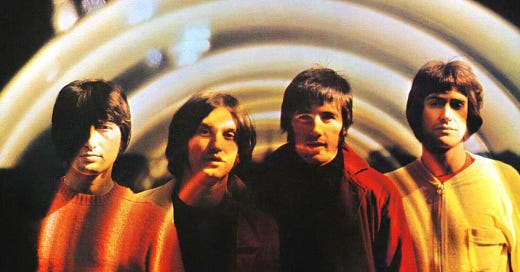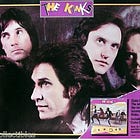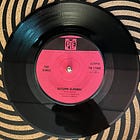Okay, so I lied. Sort of.
I wrote in my last newsletter that I find doingTop 10 lists an increasingly frustrating and uninspiring task. And yet, a recent conversation with a friend has inspired me to spend the insomniac hours of the last few nights mulling over another Top 10 list — though the fact that this one concerns an act I never tire of thinking and arguing about makes all the difference…
If you’ve been following JTL for a while now, you’ve probably figured out that The Kinks are my all-time favorite band. I’ve been a dedicated follower of Ray and Dave Davies since 1980, and no other band’s music has soundtracked as many of my life’s high and low points, or given me as much comfort, perspective and inspiration as that of The Kinks. I highly doubt that will ever change.
Over the years, though, certain records and periods of the band have drastically shifted in my estimation. I climbed aboard the Kinks Train (steam-powered, of course) at the height of their US revival, when they’d honed their sound and songs to better fit the basketball arenas they were playing. My first favorite Kinks albums were rafter-slammers like 1979’s Low Budget, 1981’s Give the People What They Want and the 1980 live document One for the Road, so it took me a while to wrap my head and ears around their harpsichord-and-mellotron years.
Once I made that leap, however, I was all-in… but I also began to feel a tad conflicted and embarrassed by the Kinks music that had led me there, kind of like how I still cringe whenever I remember that I was turned on to John Lee Hooker by the bonehead blooze of George Thorogood. Still, you’ve gotta start somewhere, right?
I’ve long since made my peace with the band’s arena era, as well as their musical theater period of the early/mid-’70s and the woefully uneven studio albums they released during the final decade of their existence. (There have been rumbles that Ray and Dave are making music again, but after a three-decade absence I’m not exactly holding out hope for a glorious Kinks komeback.) Because even at those times when Ray’s flights of fancy made my eyes roll so hard that they practically popped out of my head, he still always came up with one or two songs per album that were so impossibly perfect that I couldn’t just walk away. Even 1993’s grotesquely overlong and overwrought Phobia was redeemed by “Scattered,” a song which still makes me tear up every time I hear it.
All of which is to say that I have spent a lot of time with every album The Kinks ever made, so I don't take the task of ranking my Top 10 favorite Kinks studio albums lightly. Of course, I’m saying “favorite” here and not “best” — these are the ones I reach for most often, for whatever reason. And if you’re looking for a place to begin your Kinks journey, you’re probably better off starting with The Kinks Kronikles (which compiles a fantastic cross-section of their best singles, b-sides and album tracks from 1966-71) than with any of these. But here we go…
The Kinks Are The Village Green Preservation Society
By now, it’s pretty much a matter of critical record that The Kinks made their best, most interesting and/or most intrinsically English records between 1966 and 1969, and the likelihood that a Kinks fan will name an album from this period as their favorite is thus pretty damn high. But which one?
For me, it’s 1968’s Village Green, a collection of character studies and gently pointed musings on life in a bucolic English village as it deals with the pressures of the 20th century. The fact that it was recorded at a glorified demo studio (and sounds it) rubs some listeners the wrong way, but to me it’s just absolute perfection — and bigger production might have smothered the charming delicacy of these songs. My favorite track? Almost impossible to say, but the pastoral psychedelia of “Sitting by the Riverside” might carry the day for me.
Something Else by the Kinks
The first “old” Kinks album I ever purchased — and despite its rather unpromising title, 1967’s Something Else is an absolutely glorious listen, filled with one fantastic Ray song after another and abetted by three good-to-great Dave compositions. The Carnaby Street colors of 1966’s Face to Face are still in effect, but there’s also a weirdly timeless aspect to songs like “Harry Rag,” “Two Sisters” and “Afternoon Tea,” like you’ve just opened up a dusty old trunk in the attic and found them sitting there. And the album ends with “Waterloo Sunset,” which may well be the best song ever written by anyone ever.
Face to Face
This 1966 LP was the second “old” Kinks album I ever purchased, and for years I touted it as my favorite. No shame at all in that, really — all 14 tracks here are absolutely wonderful, and the album shows the band transitioning out of their raucous beat group origins (“Party Line,” “You’re Looking Fine,” “I’ll Remember”) and towards Ray’s newfound flair for witty story songs (“Dandy,” “Session Man,” “Sunny Afternoon”). Favorite track? “Too Much on My Mind,” a baroque meditation on depression that still stops me in my tracks whenever I hear it.
Arthur (Or the Decline and Fall of the British Empire)
Ray spent the first half of the 1970s chasing his concept album/rock opera dreams, but no Kinks album has a story arc that holds together as well — and as tunefully — for me as 1969’s Arthur. The album begins by reveling in the British Empire’s glorious past (“Victoria”) and ends with the title character’s family leaving him behind as they emigrate to Australia for a better life; and along the way, the album touches on both World Wars, the privations of post-war England, and the modern generation gap. Favorite song? Probably “Some Mother’s Son,” which is about as heartbreaking an anti-war song as I’ve ever heard.
Sleepwalker
Yeah, this one may surprise some of you, but over the years the first album of their Arista period has slowly crept into my Kinks Top 5. Ditching the theatrical concepts in favor of emotionally resonant songs and straight-ahead, FM-friendly rock, this 1977 LP still holds up wonderfully for me today, which (despite the presence of a few brilliant tracks) sadly can’t be said about the patchier follow-up Misfits. Favorite song? I’m gonna go with “Full Moon,” a moody ballad which slowly escalates to an absolutely shattering conclusion.
The Kinks Kontroversy
I have at least one pal who rates this 1965 LP as their favorite Kinks album, and it’s hard for me to argue with that. After all, it’s far and away the strongest of their first three albums, and if you prefer their early snarl to their more sedate stuff from the second half of the sixties, Kontroversy is the one to grab. Favorite track? “The World Keeps Going Round,” which has long served as a mantra for me whenever I’m bummed out about things that are out of my control.
Lola Versus Powerman and the Moneygoround, Part One
There are many great songs on this 1970 LP (including “Apeman,” the title track, and Dave’s “Strangers”), though the tinny production and the rather ham-fisted “artist against the industry” theme keep me from pulling it out as often as I probably should. Favorite track: The introspective “This Time Tomorrow,” which was kind of my personal theme song during the second half of my senior year of high school.
Muswell Hillbillies
Another great Kinks album I probably don’t pull out as often as I should, probably because I’m not always in the mood for the wheezing brass of the Mike Cotton Sound, who first joined up with The Kinks for this 1971 foray into American roots rock crossed with British music hall. Favorite track? I’ll go with “20th Century Man,” which nicely sets the tone for the rest of the album with its howl of alienation and disappointment, but also stands on its own as one of Ray’s most biting forays into social commentary.
Preservation Act 1
As much of a Kinks fan as I am, I have never, ever cared at all about Preservation, Ray’s strident rock musical pet project about commerce and corruption laying waste to one of his fictional villages. That said, about half of Act 1’s songs are pretty great on their own terms; and my favorite track from it, the wistful “Sweet Lady Genevieve,” may well be one of his best songs of the 1970s.
Word of Mouth
Released in late 1984, Word of Mouth was the band’s first real commercial stiff in nearly a decade; it only reached #57 on the Billboard charts, their lowest charting effort since 1974’s Preservation Act 2. Which is a shame, since Side One of the album features some of the hardest-rocking Kinks tracks of the 1980s (“Do It Again,” “Word of Mouth,” “Sold Me Out”), along with the hopeful gem “Good Day”. Side Two is unfortunately rougher sledding; “Massive Reductions”’s lyrics about corporate layoffs are far better than its music, and nobody needed Ray to frantically opine on the fitness craze (“Too Hot”). But I often pull the album out just to hear its first side, which also contains my favorite track: Dave’s soulful lament “Living On a Thin Line,” which was later featured to fine effect in a Sopranos episode.
Okay, Kinks fans — what have you got? Gimme your Top 10s (or at least your Top 3s) in the comments!







Thanks for including Word of Mouth. I have always loved that album. And I refuse to apologize for my Kinks-arena rock fandom. I think The Kinks did better than any of the other legacy rock acts of fusing classic rock, punk, new wave, etc. into one coherent sound. But perhaps my all-time favorite Kinks song is off of Sleepwalker in “Life Goes On.”
I have a real soft spot for Phobia. Somehow that was one of the cassettes I had with me on my 1993 Europe travels/class study/internship, and I listened to that one perhaps more than any of the others I brought with me.
I'm a Something Else... guy but Village Green is undeniable. Ray Davies might be my favorite songwriter, sorry Pete Townshend... So consistently good.